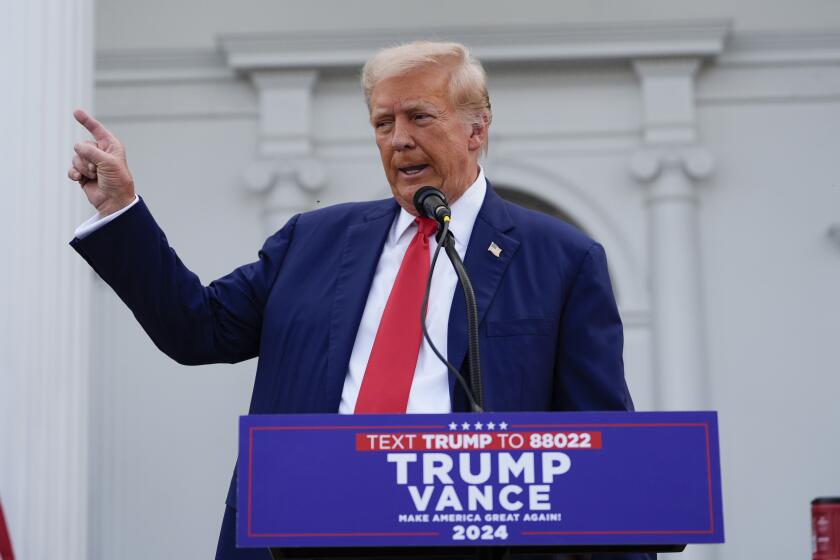Massive Loan for State Weighed
As Gov.-elect Arnold Schwarzenegger prepares to take office, his aides are testing the waters for a possible budget solution that would include having the state go into debt to pay off a substantial portion of the coming year’s deficit.
Officials with the new administration say they are still developing their budget plan, and its final elements remain unsettled.
But aides to Schwarzenegger have approached financial institutions to discuss how the state could go about securing a loan large enough to cover the entire deficit, according to sources on both sides of the discussions. That bond could be as large as $20 billion, perhaps more. The sources spoke on condition that they not be identified.
The queries, according to one source who has been involved in the discussions, focus on what kind of guarantees would have to be built into a budget to reassure bond buyers that the debt would be repaid.
Such a loan would be based on the assumption that the economy is already beginning to revive, which would cause future tax revenues to rise. If the state can get past this year’s deficit, according to that line of thinking, future budgets could be kept in balance by a mandatory cap on state spending.
Schwarzenegger seems likely to put both the borrowing and the spending cap before state voters in March. Doing so would require gaining legislative approval by Dec. 5.
Some of the most fiscally conservative advisors to Schwarzenegger say there may not be any other options if Schwarzenegger intends to keep his promise not to raise taxes and to rescind the recent increase in the state’s vehicle license fee.
“You are probably going to need to have this kind of borrowing package,” said Carl DeMaio of the Reason Foundation, which is advising Schwarzenegger on the budget. “Otherwise you are talking about massive cuts in services.”
Joel Fox, a Schwarzenegger campaign advisor and the former president of the Howard Jarvis Taxpayers Assn., said: “You’re looking at a lesser of two evils strategy -- the bond issue versus tax increases.”
Those statements come as at least an implicit acknowledgment by Republican strategists of a position Democrats have taken for most of the past year -- that despite talk about government waste, the budget cannot be balanced without either tax increases or deep cuts in services.
Republicans and Democrats also seem to be shifting positions on the desirability of further government borrowing.
During his campaign, Schwarzenegger promised to “end the crazy deficit spending” and “ensure that California government lives within its means -- something working families manage to do every day -- and rein in spending to close the operating deficit.”
Many of those now helping craft the governor-elect’s budget plan -- including the Reason Foundation, the current president of the Jarvis Assn. and conservative economists from Stanford University’s Hoover Institution -- have also been sharp critics of past borrowing.
What makes Schwarzenegger’s borrowing plan better than Democratic borrowing plans is that “this time ... we truly balance the budget going forward,” said Assemblyman John Campbell (R-Irvine), another advisor to Schwarzenegger.
The idea, Campbell said, would be to give the state a clean slate; wipe out the debt and then move forward with a spending freeze and a constitutional cap on the growth of government that would force Sacramento to bring spending into line with revenues.
“The size of [the borrowing] is not as critical to me as the fact that, once we are done, that this will be the last borrowing,” Campbell said.
Last year, the Legislature approved a budget that included $13 billion in borrowing. Those bonds have been under legal challenge because they were not approved by voters. Schwarzenegger’s aides have suggested asking voters to approve that amount of debt. The question now is how much larger a bond might be needed to cover next year’s deficit as well.
Democrats, many of whom backed past bond measures, say the Republicans are being hypocritical.
“If Gray Davis had contemplated a $20-billion bond, I could imagine the outcry from fiscal conservatives,” Treasurer Phil Angelides said last week.
Angelides, who is considering a run for governor in 2006, used a briefing on the state’s annual debt affordability report to show how borrowing $20 billion would hurt Californians. He said it would cost almost another $20 billion in interest and other expenses over the 30-year life of the bond.
“It doesn’t make sense to keep running up a credit card debt that will become due,” the treasurer scolded. “There are real costs. It’s not magic money.”
Angelides has restructured roughly $10 billion of California’s debt, pushing the full cost of government programs further into the future.
In January 2002, Angelides designed a plan to borrow so the state could put off paying $1.1 billion that was due investors, freeing up cash for other budget priorities. The cost to taxpayers: another $1 billion over 30 years in interest payments.
The treasurer has also set the state on a course of putting off paying principal on long-term bonds for as long as five years. Angelides argued last year that this approach actually saves taxpayers overall because inflation will have reduced the value of the dollars they will have to pay back. But several economists have criticized the restructuring, saying it will place too large a burden on future Californians.
Angelides argues that the refinancing he advocated in the past allowed the state to keep spending money on vital education and infrastructure programs.
Schwarzenegger’s plan could have the opposite effect, he said, crowding out the market for proposed bond sales to pay for education and a high-speed rail system between Northern and Southern California.
Fiscal conservatives say Angelides has little standing to lecture the incoming governor on borrowing.
“He has used every single tool available to shake the money tree for refinancing in a way that does nothing to serve the long-term interest of taxpayers,” said DeMaio. “His use of refinancing contributed to extending the crisis instead of forcing the state to deal with it.”
Democrats like Angelides, Controller Steve Westly and legislative leaders have attacked Republican suggestions for solving the budget crisis, while offering few proposals of their own. A year ago, the opposite was true. Republicans came under fire for shooting down any talk of closing the budget gap with a tax increase, while offering little in the way of alternative solutions.
The world also appears to have changed for some conservative taxpayer groups, especially the Jarvis Assn., which endorsed Schwarzenegger. The group has long argued against large government borrowing on the grounds that doing so saddles future taxpayers with large interest payments. Now, leaders of the group are advising Schwarzenegger on a budget plan that is likely to include the bond issue.
Republican consultant Dan Schnur says groups such as the Jarvis Assn. and the Pacific Legal Foundation, both of which are suing the state over the borrowing in last year’s budget, are wise to stray from rigid platforms.
“Their choice is to either find ways to be helpful or become politically irrelevant,” he said. “They can maintain ideological purity from the ivory tower or recognize that conservative values can be a part of a realistic budget solution.”
There may be one way to save face through it all, however. In taking a borrowing plan before voters, lawmakers won’t appear to be thrusting it upon the public.
As Schnur says, it may “give everybody an out.”
Asked if he and his members were willing to be more flexible with their ideology to help the new governor, Jon Coupal, president of the Jarvis Assn., said, “the short answer is yes.”
Coupal said he’s uneasy about it all, but he also said there can be rich trade-offs to his group’s support for some degree of borrowing. He has already helped draft a constitutional spending cap that the new administration is likely to push, and Schwarzenegger has pledged to rescind the recent $4-billion-a-year increase in vehicle registration fees.
But Coupal warned that the group draws the line on taxes. If Schwarzenegger reneges on his promise not to raise them, Coupal said, Jarvis Assn. members will rise in opposition.
“The question here is to what extent are movement conservatives going to allow or approve of some degree of flexibility for this administration to deal with the mistakes of the prior administration,” Coupal said. “If the direction the state goes in is positive, the answer for us is yes, we are going to be flexible.”
More to Read
Get the L.A. Times Politics newsletter
Deeply reported insights into legislation, politics and policy from Sacramento, Washington and beyond. In your inbox three times per week.
You may occasionally receive promotional content from the Los Angeles Times.











